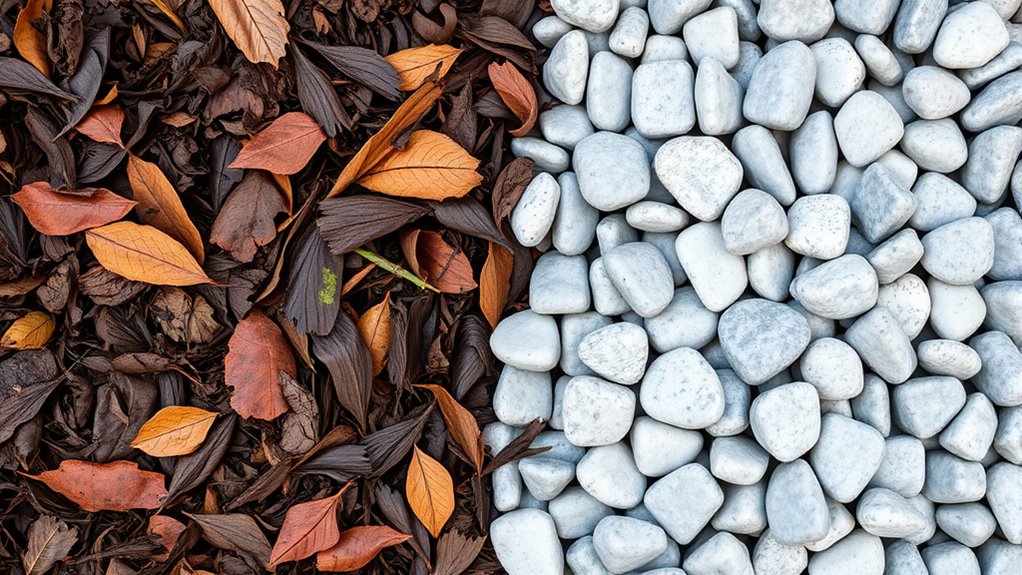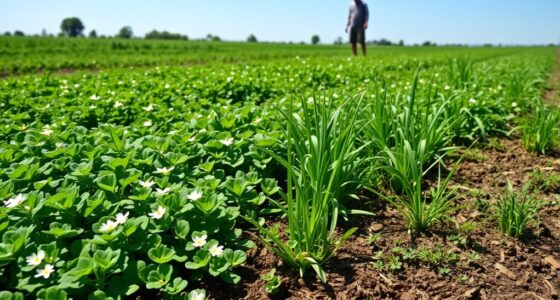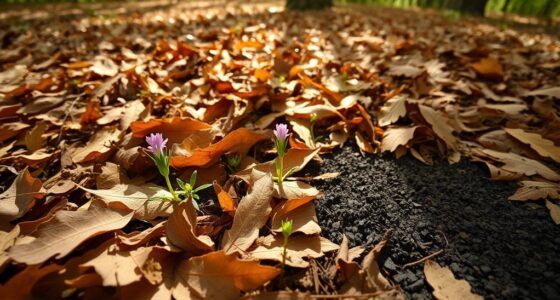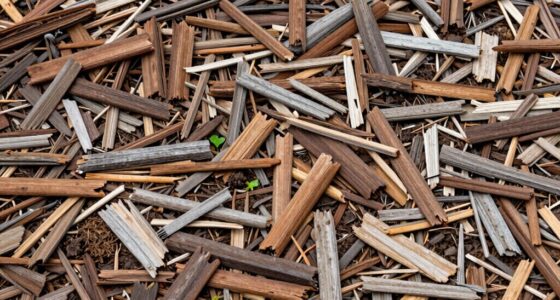Organic mulches like bark, straw, and wood chips break down over time, enriching your soil and helping plants grow stronger. Mineral mulches such as gravel or rubber last longer and help regulate soil temperature but don’t add nutrients. Organic options boost soil health and suppress weeds effectively, while mineral mulches require less maintenance. To understand which suits your garden needs best, check out more details about their differences and benefits.
Key Takeaways
- Organic mulches decompose over time, enriching soil nutrients, while mineral mulches are durable and do not add nutrients.
- Organic mulches improve soil health and fertility, whereas mineral mulches primarily regulate temperature and moisture.
- Organic mulches effectively suppress weeds and support beneficial soil organisms; mineral mulches provide a physical weed barrier.
- Organic mulches require regular replenishment due to faster breakdown; mineral mulches last longer with minimal maintenance.
- The choice depends on priorities: organic for soil health and environmental benefits, mineral for low maintenance and durability.
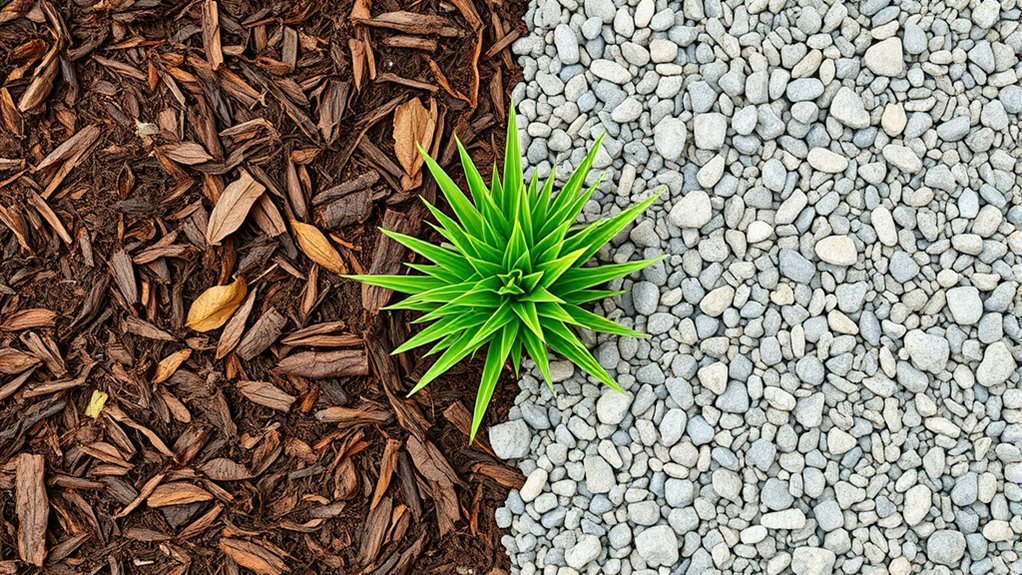
What type of mulch best suits your garden’s needs? That’s the key question when deciding between organic and mineral mulches. Each offers unique benefits, but your choice depends on your garden’s specific goals. If you’re aiming to conserve soil moisture and reduce weeds effectively, understanding the differences can help you make an informed decision.
Organic mulches, like bark, straw, compost, and wood chips, are great for improving soil health over time. They break down gradually, adding organic matter that boosts soil fertility and promotes healthy plant growth. When you use organic mulch, you’ll notice better soil moisture retention because these materials help keep the soil consistently damp, especially during hot, dry spells. Plus, organic mulches excel at weed suppression because they form a thick, natural barrier that prevents light from reaching weed seeds. This makes it harder for weeds to germinate and establish themselves, reducing the need for manual weeding or chemical herbicides. As the mulch decomposes, it also feeds beneficial soil organisms, creating a more vibrant and resilient garden ecosystem. However, organic mulches do require periodic replenishment, especially in areas with heavy rainfall or high temperatures, since they break down faster.
Organic mulches like bark and straw improve soil health, retain moisture, and suppress weeds naturally.
Mineral mulches, such as gravel, rocks, and rubber, are more durable and tend to last longer without much maintenance. They don’t decompose like organic options, so you won’t need to replace them frequently. Mineral mulches are excellent at managing soil moisture because they help regulate temperature and prevent rapid evaporation of water from the soil surface. This stability can be especially beneficial in arid environments or gardens where consistent moisture levels are critical. When it comes to weed suppression, mineral mulches create a physical barrier that prevents weed seeds from reaching the soil surface, but they’re less effective at smothering existing weeds or those that grow through cracks. Unlike organic mulches, mineral options don’t add nutrients to the soil, which means you’ll need to supplement with fertilizers if your plants require additional feeding. Additionally, some mineral mulches, like rubber, are synthetic materials that are not biodegradable, which may concern environmentally conscious gardeners.
Choosing between organic and mineral mulch ultimately hinges on your priorities. If you want to enhance your soil’s fertility and promote a thriving ecosystem while controlling weeds and conserving soil moisture, organic mulch is a smart choice. If you prefer a low-maintenance, long-lasting solution that offers good moisture regulation and weed suppression without much fuss, mineral mulch might suit you better. Both types can play vital roles in your gardening strategy, but understanding these differences helps ensure you select the right mulch for your garden’s needs.
Frequently Asked Questions
Which Mulch Type Is More Environmentally Sustainable?
You should choose organic mulch for better environmental sustainability. Organic options, like compost benefits, help enrich the soil, support beneficial microbes, and decompose naturally, reducing waste. Mineral mulches, on the other hand, have drawbacks such as non-renewability and potential heat retention, which can harm plants. By opting for organic mulch, you promote healthier soil and a more eco-friendly garden, making it a smarter, sustainable choice.
How Do Mulch Types Affect Soil Ph Levels?
Did you know that organic mulch can raise soil pH by buffering acidity, making soil less acidic over time? You’ll find that organic mulches like wood chips or compost gradually promote pH adjustment, benefiting plants sensitive to soil acidity. Conversely, mineral mulches such as gravel usually don’t substantially change soil pH, maintaining existing soil conditions. Your choice of mulch can directly influence soil health and plant growth through these pH effects.
Can Mulch Types Help Control Specific Pests?
Yes, mulch types can help control specific pests. Organic mulches like compost benefits from their natural properties, which can deter pests and promote healthy soil. They also provide weed suppression, reducing pest habitats. Mineral mulches, such as gravel, don’t decompose and can create a hostile environment for pests that thrive in organic matter. Choosing the right mulch enhances pest control and supports overall garden health.
What Are the Long-Term Maintenance Costs for Each Mulch?
You’ll find that organic mulch tends to have higher long-term maintenance costs because it decomposes, requiring regular replenishment, which helps with weed suppression and enhances aesthetic appeal. Mineral mulch, on the other hand, lasts longer, reducing costs over time, but might need occasional top-ups. Both improve weed control and aesthetics, so your choice depends on balancing initial expenses with ongoing upkeep and your desired look.
Are There Any Health Risks Associated With Mineral Mulches?
Mineral mulches can pose health risks, especially regarding toxicity concerns and respiratory hazards. When disturbed or broken down, they may release dust containing potentially harmful substances, which you could inhale. To protect yourself, wear masks during installation or maintenance and handle them carefully. Although generally safe, it is crucial to stay cautious, especially if you have respiratory issues or sensitivities, to minimize any health risks associated with mineral mulch exposure.
Conclusion
Choosing between organic and mineral mulch is like picking a paint color—you’ll want what best suits your garden’s personality. I once used organic mulch in my flower bed, and within months, it looked like a thriving, lush oasis. Just like a good paint job, the right mulch enhances your garden’s beauty and health. So, weigh your needs carefully and pick the mulch that turns your yard into your personal paradise.
